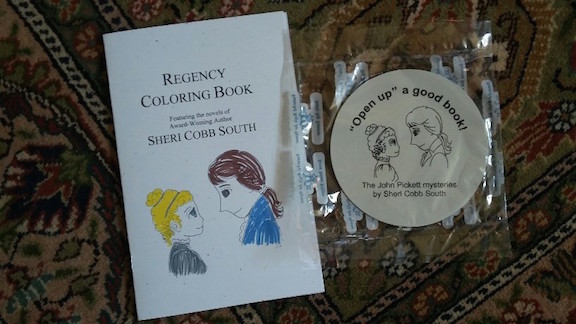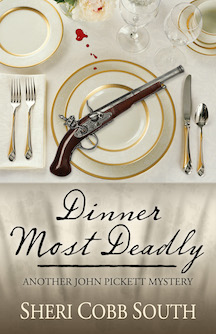 Last Wednesday marked the release of Too Hot to Handel, the fifth novel in the John Pickett series of mysteries set in Regency England. I’ve so looked forward to this one, for a couple of reasons: it’s my personal favorite and, not coincidentally, it’s the one that finally resolves the romance between Bow Street Runner John Pickett and the widowed Julia, Lady Fieldhurst, whom he first met, quite literally over her husband’s dead body, in the first book of the series, In Milady’s Chamber.
Last Wednesday marked the release of Too Hot to Handel, the fifth novel in the John Pickett series of mysteries set in Regency England. I’ve so looked forward to this one, for a couple of reasons: it’s my personal favorite and, not coincidentally, it’s the one that finally resolves the romance between Bow Street Runner John Pickett and the widowed Julia, Lady Fieldhurst, whom he first met, quite literally over her husband’s dead body, in the first book of the series, In Milady’s Chamber.
But before there was Too Hot to Handel, there was Waiting Game—a novella that was never intended as part of the series at all, and yet sold more than 1,500 copies in the last month alone.
How did it happen? It’s a long story—no pun intended. Too Hot to Handel was originally scheduled for March 2016, but just before Christmas my publisher, Five Star/Cengage, announced that due to unforeseen circumstances, the entire 2016 publishing schedule was being delayed three months, pushing my March release date back to June. Now, a three-month postponement may not seem like much, but when marketing plans are measured in months, not weeks, every one of those months is crucial. My bookmarks had already been printed with “March 2016” as the release date—and I didn’t even want to think about what the interruption meant as far as ARCs, which would probably go out much too late for the major reviewers such as Publishers Weekly and Library Journal.
But the people I felt the worst for were my readers. I’d left them a romantic cliffhanger at the end of the previous book, Dinner Most Deadly, which concludes with [spoiler alert!] John Pickett recklessly declaring himself to Julia, who is too stunned—and too moved—to respond. I had assured readers they wouldn’t have long to wait for resolution on this, since the next book would be out in only six months, rather than the more typical ten to twelve, and now I discovered that I was wrong. Granted, it wasn’t my fault, but I still felt like I’d lied to them.
I felt like I owed fans of the series something to make it up to them. I’d had some success with a prequel novella called Pickpocket’s Apprentice, so I decided to write a short piece to self-publish in March, something that would fill in the gap in the timeline between the end of Dinner Most Deadly and the beginning of Too Hot to Handel. Ironically, that gap was also three months, from November 1808 to February 1809.
It was a good idea in theory, but I soon realized I’d written myself into a corner. The book’s setting made it practically imperative that the Christmas season be addressed in some way, but I didn’t want it to turn into a Christmas story, given that it would be released in March. Furthermore, since the text of Too Hot to Handel makes it very clear that there has been no interaction between Pickett and Julia during those three months, I somehow had to advance the romance without ever putting the potential lovebirds together.
 One of the women in my writers’ group suggested that I let Pickett be actively trying to avoid being seen by Lady Fieldhurst, and it seemed to me that this situation would lend itself well to comedy. Since Pickett had extracted a reluctant promise from his magistrate not to send him on cases involving the aristocracy, where he might encounter Julia, I decided to create a scenario involving the merchant middle class. Of course there would be a marriageable young woman whose advances he would have to rebuff. (There’s always some girl after poor John Pickett; it’s a running gag throughout the series.) Throw in a big dog named Brutus who manages to steal almost every scene in which he appears, and the story practically began to write itself. And hey, since this story involved a linen-draper’s shop, wouldn’t it be fun to include a cameo appearance by a youthful Ethan Brundy, titular hero of The Weaver Takes a Wife, the most popular book I’ve ever written? (After writing three books about the man, I should have known him better than that. He refused to remain a mere bit player, and insisted on assuming a significantly larger role than I’d intended.)
One of the women in my writers’ group suggested that I let Pickett be actively trying to avoid being seen by Lady Fieldhurst, and it seemed to me that this situation would lend itself well to comedy. Since Pickett had extracted a reluctant promise from his magistrate not to send him on cases involving the aristocracy, where he might encounter Julia, I decided to create a scenario involving the merchant middle class. Of course there would be a marriageable young woman whose advances he would have to rebuff. (There’s always some girl after poor John Pickett; it’s a running gag throughout the series.) Throw in a big dog named Brutus who manages to steal almost every scene in which he appears, and the story practically began to write itself. And hey, since this story involved a linen-draper’s shop, wouldn’t it be fun to include a cameo appearance by a youthful Ethan Brundy, titular hero of The Weaver Takes a Wife, the most popular book I’ve ever written? (After writing three books about the man, I should have known him better than that. He refused to remain a mere bit player, and insisted on assuming a significantly larger role than I’d intended.)
It’s not strictly necessary to read Waiting Game to enjoy Too Hot to Handel, but I do strongly recommend reading at least one of the John Pickett mysteries before reading the romantic denouement. While the mystery will stand alone, the love story will be more satisfying if you’re at least somewhat familiar with the characters’ history up to this point. Besides, romantic resolution, much like book publication, is all the sweeter for having been delayed.
Waiting Game
Amazon • Barnes & Noble • Kobo • iBooks
Too Hot to Handel
Commenters
Win a copy of both John Pickett novellas (Waiting Game and the prequel novella, Pickpocket’s Apprentice) by leaving a comment.
Check out this great offer from Sheri!
Sheri is concerned that the three month delay might have a deleterious effect on sales of Too Hot to Handel to libraries. So… anyone who requests that their library purchase Too Hot to Handel can email a screen shot of their filled-out request form to her at Cobbsouth@aol.com along with their mailing address, and she’ll send them a handy-dandy jar opener and an 8-page coloring book featuring scenes from her novels. See photo below of both prizes. No drawing on this one; anyone who requests that their library purchase the book, and sends me a screenshot as proof, automatically wins.
About the Author
Sheri Cobb South is the author of more than twenty novels, including the John Pickett mystery series and the critically acclaimed Regency romance, The Weaver Takes a Wife. A native of Alabama, she now lives in Loveland, Colorado.




